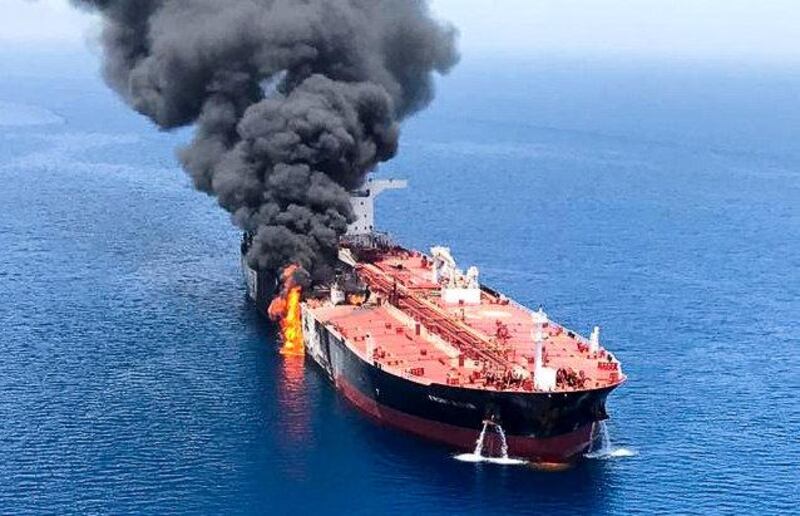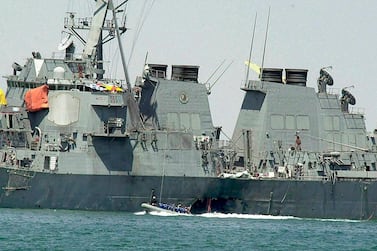US-led naval escorts could form part of international efforts that can be deployed quickly to protect commercial vessels from further attacks in Arabian Gulf oil shipping lanes as regional tensions escalate.
Measures to secure the strategic commercial waterways could include escorted convoys of shipping vessels, aerial surveillance and minesweeper vessels, Gulf security and shipping analysts said.
"There has to be a multinational effort to protect such a busy passage way," Riad Kahwaji, chief executive of Dubai-based Institute for Near East and Gulf Military Analysis (Inegma), said. "It should not take more than a couple of weeks because there are already ships for various navies like the US, the UK, France and other NATO countries operating in the region in addition to the navies of Arab Gulf states."
The targeting of six oil tankers in the waterways of the Gulf in May and June, a major artery for global oil shipments, has raised the stakes in a stand-off between Iran and the US. Washington has blamed Iran for being behind the attacks. Tehran has denied involvement.
"We strongly call for nations to do what they can to de-escalate tensions and ensure the safe passage of merchant shipping in the Strait of Hormuz," said Angus Frew, chief executive of Bimco, the largest international association representing ship owners.
A US-led international security effort could be assembled quickly given that the US and UK have had continuous patrol and minesweeping capabilities present in the Gulf region since the 1980 Iraq-Iran war, Richard Reeve, chief executive of Oxford Research Group, said.
"The bones of such a task force are already present in the Gulf and based in Bahrain, and there is a number of other ships working under US-led Combined Task Forces 150 (northern Indian Ocean) and 151 (off Somalia) that could be brought in," Mr Reeve said.
Some limitations to the naval escorts include the heavy traffic flows in the confined waterway of the Strait of Hormuz, which is 21 nautical miles wide at its narrowest point.
Traditional capabilities may be hampered against the asymmetric warfare tactics suspected in recent operations. Fast, small boats appear to have been used to carry out the attacks, using weaponry such as limpet mines.
"Asymmetric attacks have evolved and thus we are in a whole new ball game," Theodore Karasik, Senior Advisor at Gulf State Analytics in Washington, said.
Organising escorted patrols would also require a large number of vessels, which would be harder given the reduced fleet sizes of the US and allied navies in the region since the 1980s, Mr Reeve said.
"The additional challenge in 2019 is that Iran now has the ability to pose a threat to shipping in the southern Red Sea choke point via its influence with the Houthi group that controls part of Yemen’s coast," he said. "Thus, there would be a need to patrol these congested waters also."
Jakob P Larsen, the Bimco head of maritime security, said "the tension in the Strait of Hormuz and the Arabian Gulf is now as high as it gets without being an actual armed conflict”.
International Maritime Organization's Secretary-General Kitack Lim said the attacks "concern me greatly."
"The threat to ships and their crews, peaceably going about their business, is intolerable," he said.
The situation echoes the 1980s Tanker War and when Somali pirates threatened commercial shipping more recently.








